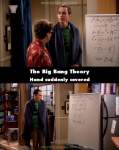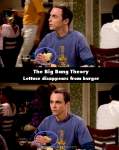The Hamburger Postulate - S1-E5
Continuity mistake: When Howard demonstrates being a human beat box to Penny, the way she holds her pen changes instantly. (00:02:50)

The Hamburger Postulate - S1-E5
Continuity mistake: When Sheldon is ranting about his board being changed, there is one shot where his hand is uncovered then covered by the blanket. (00:12:00)

The Hamburger Postulate - S1-E5
Continuity mistake: At the end when Sheldon has got a burger, the amount of burger left changes depending on the camera angle. Most noticeable when he asks Penny about permanently reserving the table - between shots the lettuce disappears, the bun changes colour, and the bite marks change.
The Hamburger Postulate - S1-E5
Continuity mistake: Leonard and Leslie are rehearsing the violin and cello in the guys' living room, and when they leave the room to go to Leonard's room, Leonard's cello and stand are still in front of the comfy chair. When Sheldon gets home, the cello and stand are gone, and only Leslie's closed violin case is left on the sofa. And she picks it up and leaves with it. How did the violin get back in the case.
The Hamburger Postulate - S1-E5
Continuity mistake: When Sheldon is explaining to Leonard why a Cheesecake Factory Hamburger is superior to a Big Boy Hamburger the number of fries on Leonard's plate noticeably changes between shots.






Chosen answer: The song is called "Dark as a Dungeon" and was written and first performed by singer-songwriter Merle Travis in 1946. It has been performed by a wide array of artists, including Tennessee Ernie Ford, Harry Belafonte, Dolly Parton, Queens of the Stone Age, Kathy Mattea and Amy Grant. But it was made most famous when it was performed and recorded by Johnny Cash during his concert at Folsom Prison in 1968. According to Wikipedia: "It is a lament about the danger and drudgery of being a coal miner in an Appalachian shaft mine. It has become a rallying song among miners seeking improved working conditions."
Michael Albert